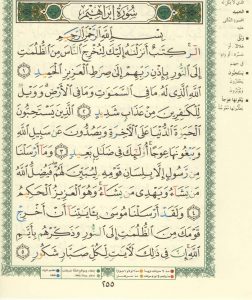Surah Ibrahim
Contents
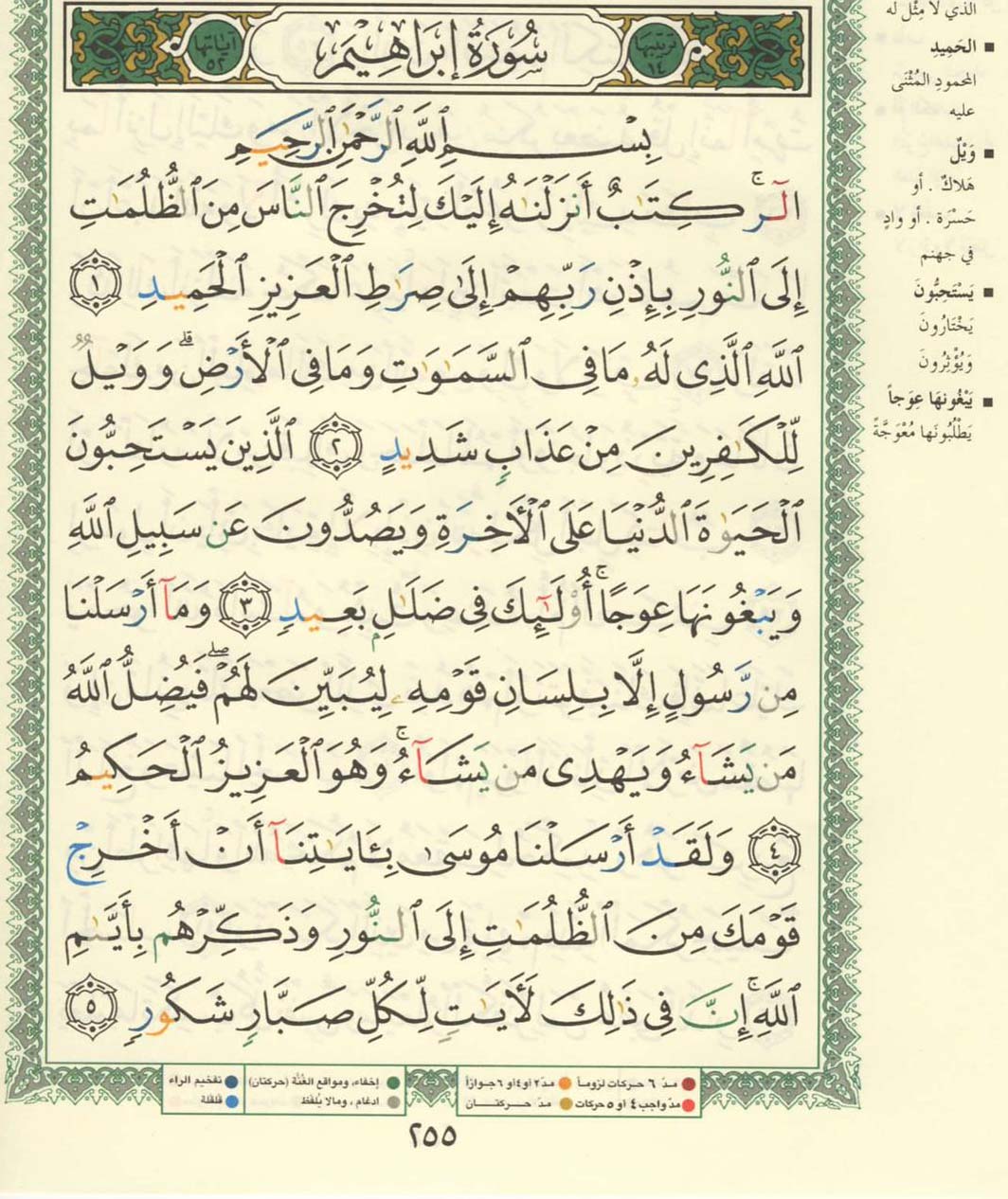
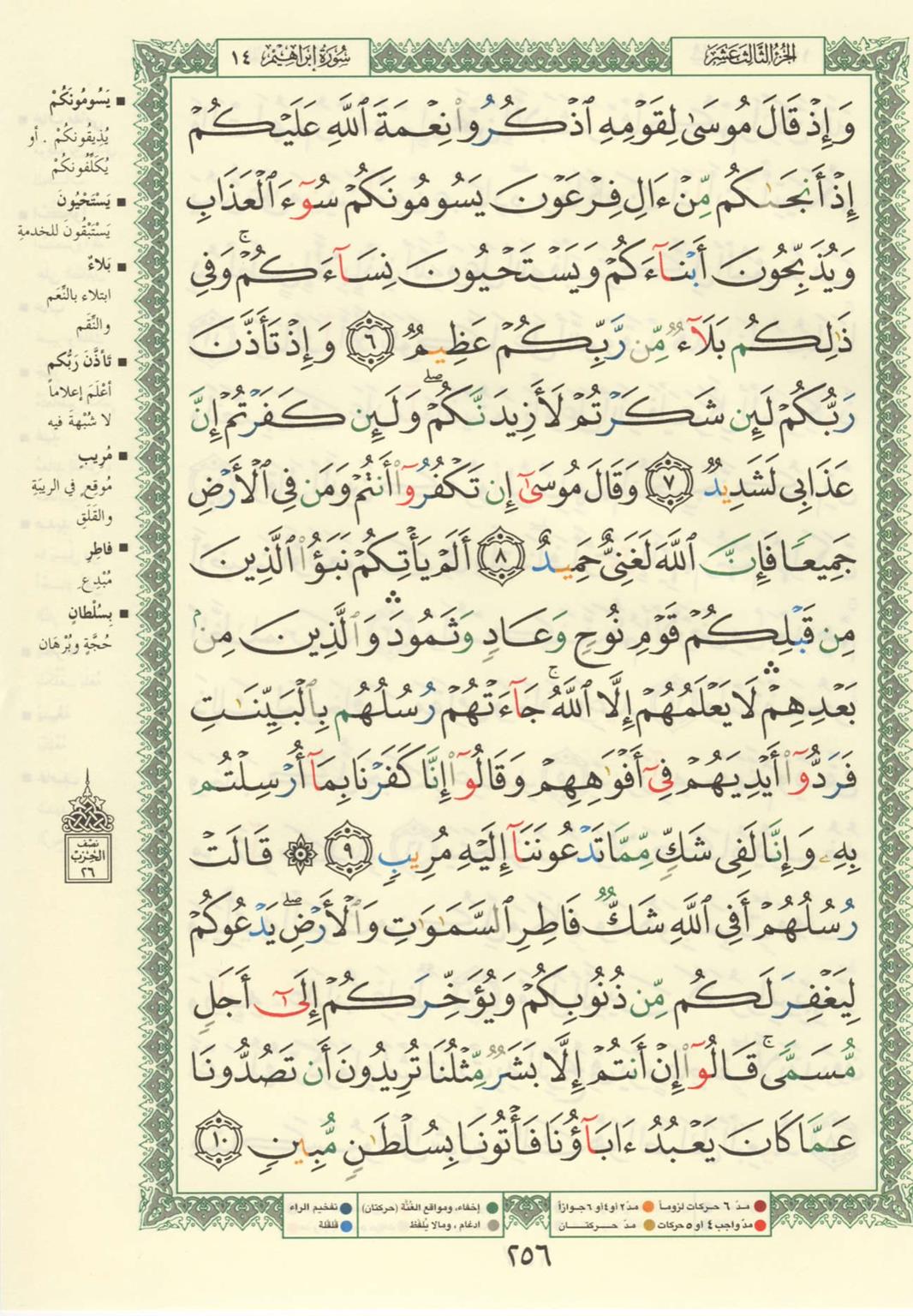
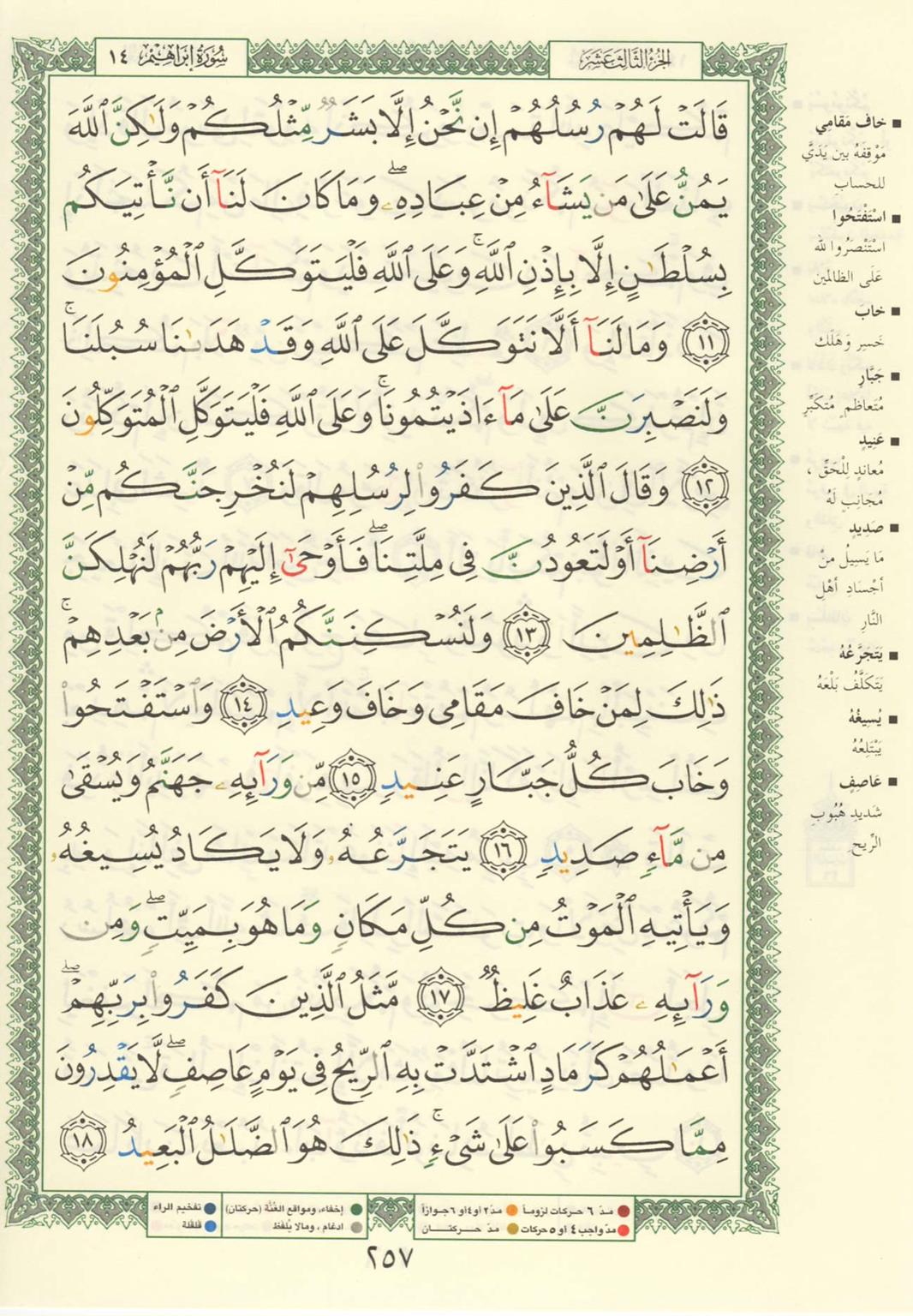
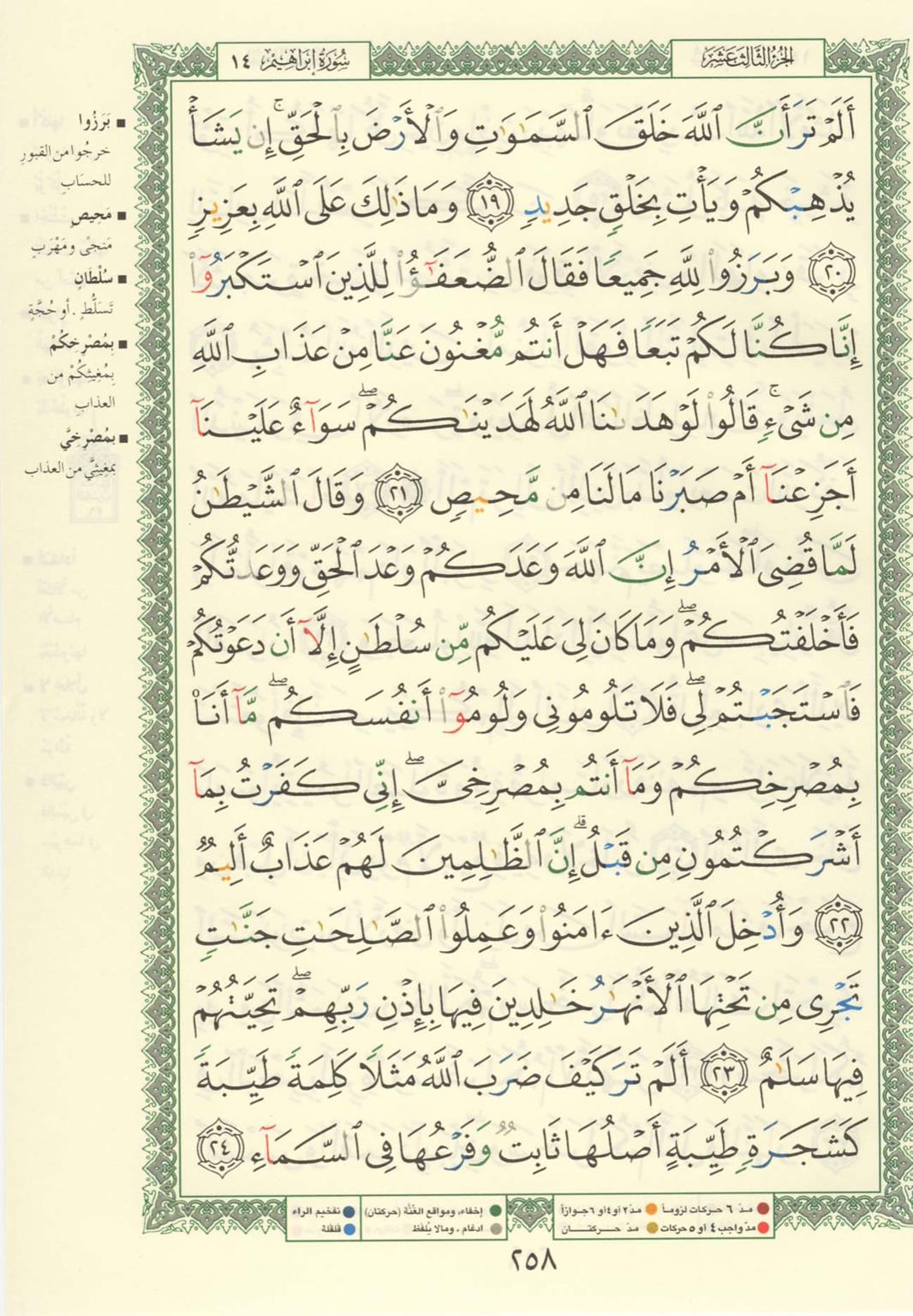
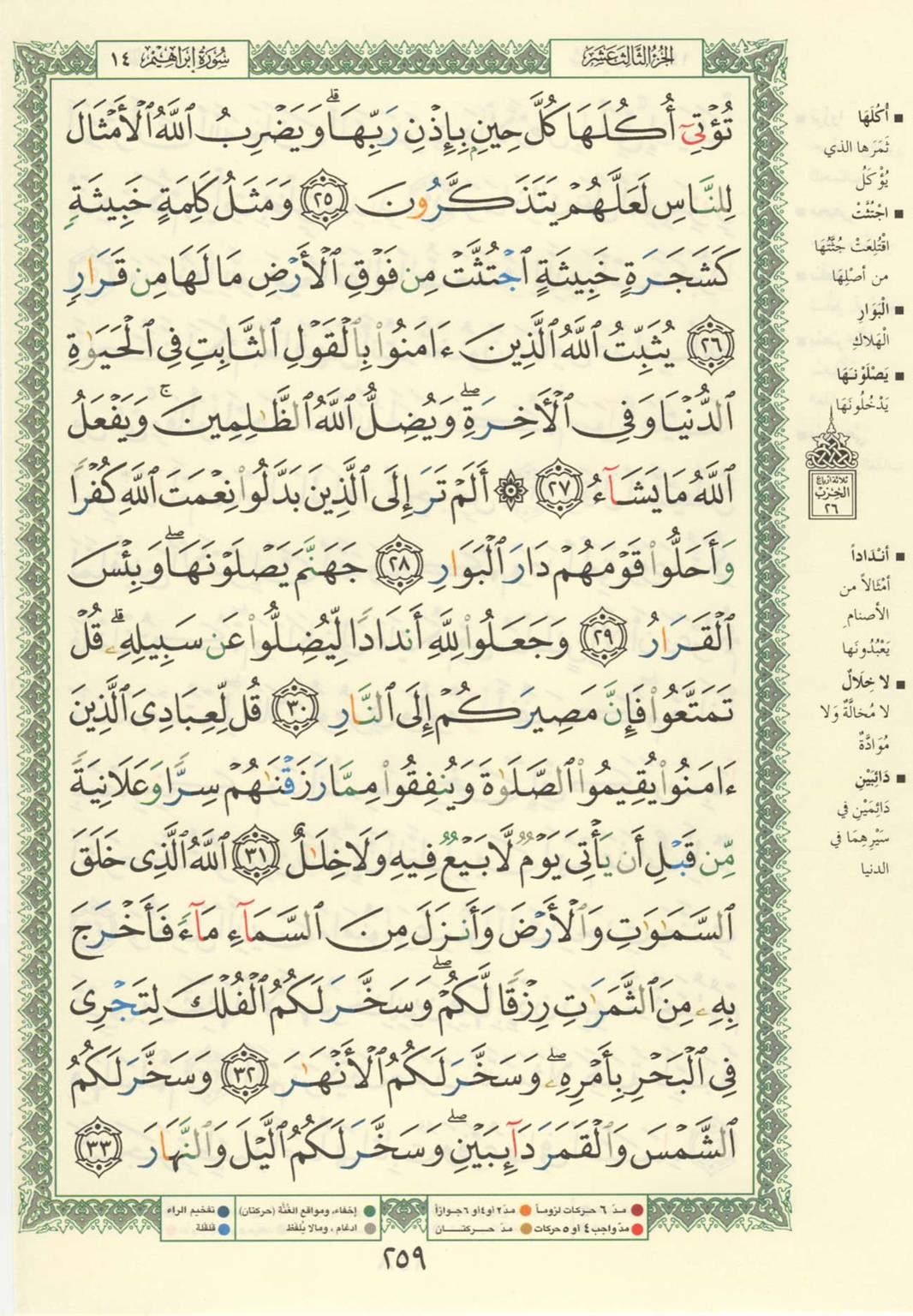
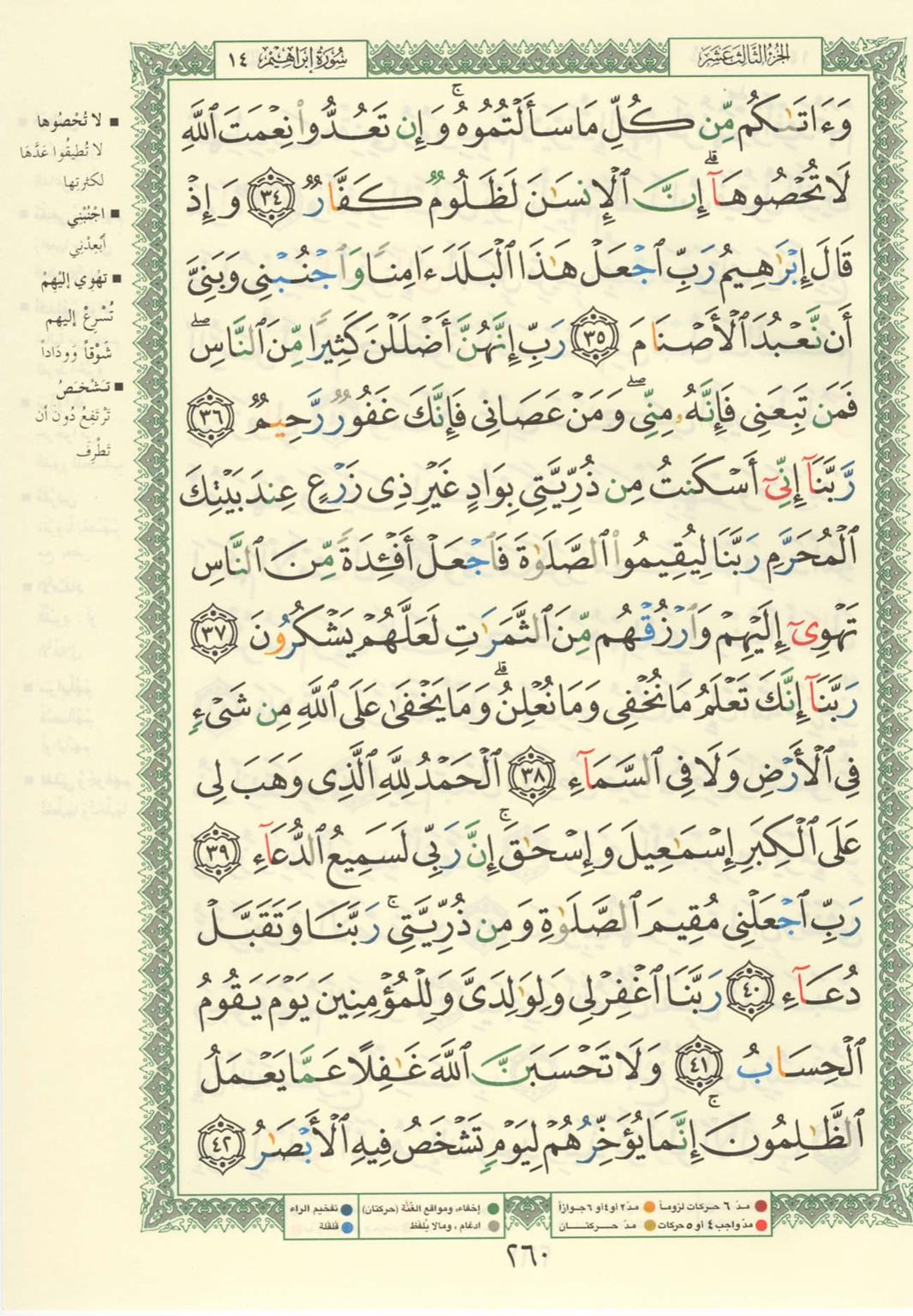
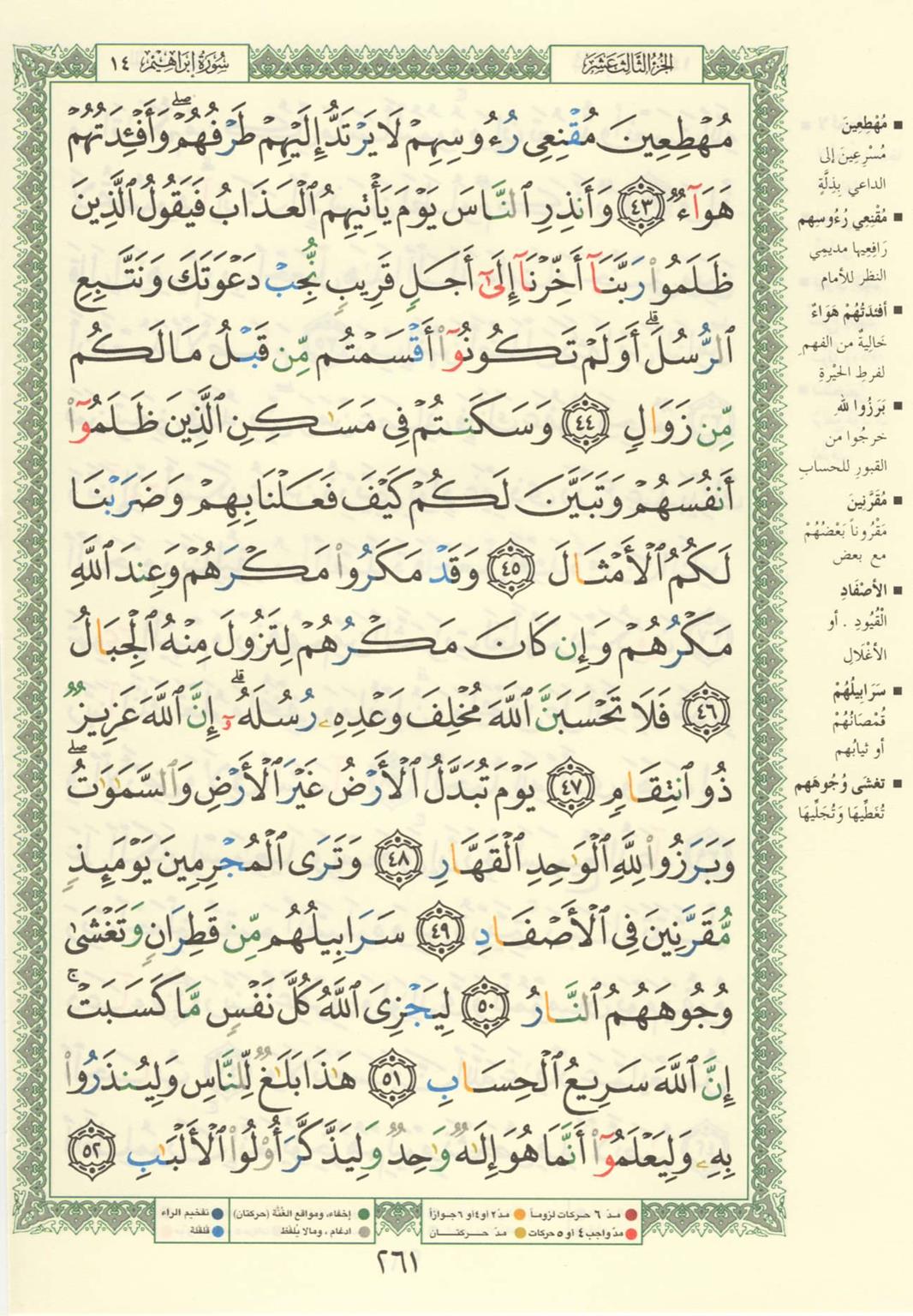
Page 255
14:1
ا-ل-ر
![]() الٓرۚ
الٓرٰ ۫—
alif-lam-ra
Alif Laam Ra.
الٓرۚ
الٓرٰ ۫—
alif-lam-ra
Alif Laam Ra.
ك-ت-ب
![]() كِتَٰبٌ
كِتٰبٌ
kitābun
A Book
كِتَٰبٌ
كِتٰبٌ
kitābun
A Book
ن-ز-ل
![]() أَنزَلۡنَٰهُ
اَنْزَلْنٰهُ
anzalnāhu
which We have revealed
أَنزَلۡنَٰهُ
اَنْزَلْنٰهُ
anzalnāhu
which We have revealed
ا-ل-ي
![]() إِلَيۡكَ
اِلَیْكَ
ilayka
to you,
إِلَيۡكَ
اِلَیْكَ
ilayka
to you,
خ-ر-ج
![]() لِتُخۡرِجَ
لِتُخْرِجَ
litukh'rija
so that you may bring out
لِتُخۡرِجَ
لِتُخْرِجَ
litukh'rija
so that you may bring out
ن-و-س
![]() ٱلنَّاسَ
النَّاسَ
n-nāsa
the mankind
ٱلنَّاسَ
النَّاسَ
n-nāsa
the mankind
م-ن
![]() مِنَ
مِنَ
mina
from
مِنَ
مِنَ
mina
from
ظ-ل-م
![]() ٱلظُّلُمَٰتِ
الظُّلُمٰتِ
ẓ-ẓulumāti
the darkness[es]
ٱلظُّلُمَٰتِ
الظُّلُمٰتِ
ẓ-ẓulumāti
the darkness[es]
ا-ل-ي
![]() إِلَى
اِلَی
ilā
to
إِلَى
اِلَی
ilā
to
ن-و-ر
![]() ٱلنُّورِ
النُّوْرِ ۙ۬—
n-nūri
the light
ٱلنُّورِ
النُّوْرِ ۙ۬—
n-nūri
the light
ا-ذ-ن
![]() بِإِذۡنِ
بِاِذْنِ
bi-idh'ni
by the permission
بِإِذۡنِ
بِاِذْنِ
bi-idh'ni
by the permission
ر-ب-ب
![]() رَبِّهِمۡ
رَبِّهِمْ
rabbihim
(of) their Lord,
رَبِّهِمۡ
رَبِّهِمْ
rabbihim
(of) their Lord,
ا-ل-ي
![]() إِلَىٰ
اِلٰی
ilā
to
إِلَىٰ
اِلٰی
ilā
to
ص-ر-ط
![]() صِرَٰطِ
صِرَاطِ
ṣirāṭi
the Path
صِرَٰطِ
صِرَاطِ
ṣirāṭi
the Path
ع-ز-ز
![]() ٱلۡعَزِيزِ
الْعَزِیْزِ
l-ʿazīzi
(of) the All-Mighty,
ٱلۡعَزِيزِ
الْعَزِیْزِ
l-ʿazīzi
(of) the All-Mighty,
ح-م-د
![]() ٱلۡحَمِيدِ
الْحَمِیْدِ
l-ḥamīdi
the Praiseworthy.
ٱلۡحَمِيدِ
الْحَمِیْدِ
l-ḥamīdi
the Praiseworthy.
14:2
ا-ل-ه
![]() ٱللَّهِ
اللّٰهِ
al-lahi
Allah
ٱللَّهِ
اللّٰهِ
al-lahi
Allah
ا-ل-ل-ذ
![]() ٱلَّذِي
الَّذِیْ
alladhī
(is) the One
ٱلَّذِي
الَّذِیْ
alladhī
(is) the One
ل
![]() لَهُۥ
لَهٗ
lahu
to Him (belongs)
لَهُۥ
لَهٗ
lahu
to Him (belongs)
م-ا
![]() مَا
مَا
mā
whatever
مَا
مَا
mā
whatever
ف-ي
![]() فِي
فِی
fī
(is) in
فِي
فِی
fī
(is) in
س-م-و
![]() ٱلسَّمَٰوَٰتِ
السَّمٰوٰتِ
s-samāwāti
the heavens
ٱلسَّمَٰوَٰتِ
السَّمٰوٰتِ
s-samāwāti
the heavens
م-ا
![]() وَمَا
وَمَا
wamā
and whatever
وَمَا
وَمَا
wamā
and whatever
ف-ي
![]() فِي
فِی
fī
(is) in
فِي
فِی
fī
(is) in
ا-ر-ض
![]() ٱلۡأَرۡضِۗ
الْاَرْضِ ؕ—
l-arḍi
the earth.
ٱلۡأَرۡضِۗ
الْاَرْضِ ؕ—
l-arḍi
the earth.
و-ي-ل
![]() وَوَيۡلٞ
وَوَیْلٌ
wawaylun
And woe
وَوَيۡلٞ
وَوَیْلٌ
wawaylun
And woe
ك-ف-ر
![]() لِّلۡكَٰفِرِينَ
لِّلْكٰفِرِیْنَ
lil'kāfirīna
to the disbelievers
لِّلۡكَٰفِرِينَ
لِّلْكٰفِرِیْنَ
lil'kāfirīna
to the disbelievers
م-ن
![]() مِنۡ
مِنْ
min
from
مِنۡ
مِنْ
min
from
ع-ذ-ب
![]() عَذَابٖ
عَذَابٍ
ʿadhābin
the punishment
عَذَابٖ
عَذَابٍ
ʿadhābin
the punishment
ش-د-د
![]() شَدِيدٍ
شَدِیْدِ
shadīdin
severe.
شَدِيدٍ
شَدِیْدِ
shadīdin
severe.
14:3
ا-ل-ل-ذ
![]() ٱلَّذِينَ
١لَّذِیْنَ
alladhīna
Those who
ٱلَّذِينَ
١لَّذِیْنَ
alladhīna
Those who
ح-ب-ب
![]() يَسۡتَحِبُّونَ
یَسْتَحِبُّوْنَ
yastaḥibbūna
love more
يَسۡتَحِبُّونَ
یَسْتَحِبُّوْنَ
yastaḥibbūna
love more
ح-ي-ي
![]() ٱلۡحَيَوٰةَ
الْحَیٰوةَ
l-ḥayata
the life
ٱلۡحَيَوٰةَ
الْحَیٰوةَ
l-ḥayata
the life
د-ن-و
![]() ٱلدُّنۡيَا
الدُّنْیَا
d-dun'yā
(of) the world
ٱلدُّنۡيَا
الدُّنْیَا
d-dun'yā
(of) the world
ع-ل-ي
![]() عَلَى
عَلَی
ʿalā
than
عَلَى
عَلَی
ʿalā
than
ا-خ-ر
![]() ٱلۡأٓخِرَةِ
الْاٰخِرَةِ
l-ākhirati
the Hereafter,
ٱلۡأٓخِرَةِ
الْاٰخِرَةِ
l-ākhirati
the Hereafter,
ص-د-د
![]() وَيَصُدُّونَ
وَیَصُدُّوْنَ
wayaṣuddūna
and hinder
وَيَصُدُّونَ
وَیَصُدُّوْنَ
wayaṣuddūna
and hinder
ع-ن
![]() عَن
عَنْ
ʿan
from
عَن
عَنْ
ʿan
from
س-ب-ل
![]() سَبِيلِ
سَبِیْلِ
sabīli
(the) Path
سَبِيلِ
سَبِیْلِ
sabīli
(the) Path
ا-ل-ه
![]() ٱللَّهِ
اللّٰهِ
l-lahi
(of) Allah,
ٱللَّهِ
اللّٰهِ
l-lahi
(of) Allah,
ب-غ-ي
![]() وَيَبۡغُونَهَا
وَیَبْغُوْنَهَا
wayabghūnahā
and seek in it
وَيَبۡغُونَهَا
وَیَبْغُوْنَهَا
wayabghūnahā
and seek in it
ع-و-ج
![]() عِوَجًاۚ
عِوَجًا ؕ—
ʿiwajan
crookedness,
عِوَجًاۚ
عِوَجًا ؕ—
ʿiwajan
crookedness,
ا-و-ل-ا
![]() أُوْلَٰٓئِكَ
اُولٰٓىِٕكَ
ulāika
those
أُوْلَٰٓئِكَ
اُولٰٓىِٕكَ
ulāika
those
ف-ي
![]() فِي
فِیْ
fī
[in]
فِي
فِیْ
fī
[in]
ض-ل-ل
![]() ضَلَٰلِۭ
ضَلٰلٍ
ḍalālin
(are) far astray.
ضَلَٰلِۭ
ضَلٰلٍ
ḍalālin
(are) far astray.
ب-ع-د
![]() بَعِيدٖ
بَعِیْدٍ
baʿīdin
(are) far astray.
بَعِيدٖ
بَعِیْدٍ
baʿīdin
(are) far astray.
14:4
م-ا
![]() وَمَآ
وَمَاۤ
wamā
And not
وَمَآ
وَمَاۤ
wamā
And not
ر-س-ل
![]() أَرۡسَلۡنَا
اَرْسَلْنَا
arsalnā
We sent
أَرۡسَلۡنَا
اَرْسَلْنَا
arsalnā
We sent
م-ن
![]() مِن
مِنْ
min
any
مِن
مِنْ
min
any
ر-س-ل
![]() رَّسُولٍ
رَّسُوْلٍ
rasūlin
Messenger
رَّسُولٍ
رَّسُوْلٍ
rasūlin
Messenger
ا-ل-ل-ا
![]() إِلَّا
اِلَّا
illā
except
إِلَّا
اِلَّا
illā
except
ل-س-ن
![]() بِلِسَانِ
بِلِسَانِ
bilisāni
with the language
بِلِسَانِ
بِلِسَانِ
bilisāni
with the language
ق-و-م
![]() قَوۡمِهِۦ
قَوْمِهٖ
qawmihi
(of) his people
قَوۡمِهِۦ
قَوْمِهٖ
qawmihi
(of) his people
ب-ي-ن
![]() لِيُبَيِّنَ
لِیُبَیِّنَ
liyubayyina
so that he might make clear
لِيُبَيِّنَ
لِیُبَیِّنَ
liyubayyina
so that he might make clear
ل
![]() لَهُمۡۖ
لَهُمْ ؕ—
lahum
for them.
لَهُمۡۖ
لَهُمْ ؕ—
lahum
for them.
ض-ل-ل
![]() فَيُضِلُّ
فَیُضِلُّ
fayuḍillu
Then Allah lets go astray
فَيُضِلُّ
فَیُضِلُّ
fayuḍillu
Then Allah lets go astray
ا-ل-ه
![]() ٱللَّهُ
اللّٰهُ
l-lahu
Then Allah lets go astray
ٱللَّهُ
اللّٰهُ
l-lahu
Then Allah lets go astray
م-ن
![]() مَن
مَنْ
man
whom
مَن
مَنْ
man
whom
ش-ي-ا
![]() يَشَآءُ
یَّشَآءُ
yashāu
He wills
يَشَآءُ
یَّشَآءُ
yashāu
He wills
ه-د-ي
![]() وَيَهۡدِي
وَیَهْدِیْ
wayahdī
and guides
وَيَهۡدِي
وَیَهْدِیْ
wayahdī
and guides
م-ن
![]() مَن
مَنْ
man
whom
مَن
مَنْ
man
whom
ش-ي-ا
![]() يَشَآءُۚ
یَّشَآءُ ؕ—
yashāu
He wills.
يَشَآءُۚ
یَّشَآءُ ؕ—
yashāu
He wills.
ه-و
![]() وَهُوَ
وَهُوَ
wahuwa
And He
وَهُوَ
وَهُوَ
wahuwa
And He
ع-ز-ز
![]() ٱلۡعَزِيزُ
الْعَزِیْزُ
l-ʿazīzu
(is) the All-Mighty,
ٱلۡعَزِيزُ
الْعَزِیْزُ
l-ʿazīzu
(is) the All-Mighty,
ح-ك-م
![]() ٱلۡحَكِيمُ
الْحَكِیْمُ
l-ḥakīmu
the All-Wise.
ٱلۡحَكِيمُ
الْحَكِیْمُ
l-ḥakīmu
the All-Wise.
14:5
ق-د
![]() وَلَقَدۡ
وَلَقَدْ
walaqad
And verily
وَلَقَدۡ
وَلَقَدْ
walaqad
And verily
ر-س-ل
![]() أَرۡسَلۡنَا
اَرْسَلْنَا
arsalnā
We sent
أَرۡسَلۡنَا
اَرْسَلْنَا
arsalnā
We sent
م-و-س
![]() مُوسَىٰ
مُوْسٰی
mūsā
Musa
مُوسَىٰ
مُوْسٰی
mūsā
Musa
ا-ي-ا
![]() بِـَٔايَٰتِنَآ
بِاٰیٰتِنَاۤ
biāyātinā
with Our Signs,
بِـَٔايَٰتِنَآ
بِاٰیٰتِنَاۤ
biāyātinā
with Our Signs,
ا-ن
![]() أَنۡ
اَنْ
an
that
أَنۡ
اَنْ
an
that
خ-ر-ج
![]() أَخۡرِجۡ
اَخْرِجْ
akhrij
"Bring out
أَخۡرِجۡ
اَخْرِجْ
akhrij
"Bring out
ق-و-م
![]() قَوۡمَكَ
قَوْمَكَ
qawmaka
your people
قَوۡمَكَ
قَوْمَكَ
qawmaka
your people
م-ن
![]() مِنَ
مِنَ
mina
from
مِنَ
مِنَ
mina
from
ظ-ل-م
![]() ٱلظُّلُمَٰتِ
الظُّلُمٰتِ
ẓ-ẓulumāti
the darkness[es]
ٱلظُّلُمَٰتِ
الظُّلُمٰتِ
ẓ-ẓulumāti
the darkness[es]
ا-ل-ي
![]() إِلَى
اِلَی
ilā
to
إِلَى
اِلَی
ilā
to
ن-و-ر
![]() ٱلنُّورِ
النُّوْرِ ۙ۬—
n-nūri
the light.
ٱلنُّورِ
النُّوْرِ ۙ۬—
n-nūri
the light.
ذ-ك-ر
![]() وَذَكِّرۡهُم
وَذَكِّرْهُمْ
wadhakkir'hum
And remind them
وَذَكِّرۡهُم
وَذَكِّرْهُمْ
wadhakkir'hum
And remind them
ي-و-م
![]() بِأَيَّىٰمِ
بِاَیّٰىمِ
bi-ayyāmi
of the days
بِأَيَّىٰمِ
بِاَیّٰىمِ
bi-ayyāmi
of the days
ا-ل-ه
![]() ٱللَّهِۚ
اللّٰهِ ؕ—
l-lahi
(of) Allah."
ٱللَّهِۚ
اللّٰهِ ؕ—
l-lahi
(of) Allah."
ا-ن-ن
![]() إِنَّ
اِنَّ
inna
Indeed,
إِنَّ
اِنَّ
inna
Indeed,
ف-ي
![]() فِي
فِیْ
fī
in
فِي
فِیْ
fī
in
ذ-ل-ك
![]() ذَٰلِكَ
ذٰلِكَ
dhālika
that
ذَٰلِكَ
ذٰلِكَ
dhālika
that
ا-ي-ا
![]() لَأٓيَٰتٖ
لَاٰیٰتٍ
laāyātin
surely (are) the signs
لَأٓيَٰتٖ
لَاٰیٰتٍ
laāyātin
surely (are) the signs
ك-ل-ل
![]() لِّكُلِّ
لِّكُلِّ
likulli
for everyone
لِّكُلِّ
لِّكُلِّ
likulli
for everyone
ص-ب-ر
![]() صَبَّارٖ
صَبَّارٍ
ṣabbārin
patient
صَبَّارٖ
صَبَّارٍ
ṣabbārin
patient
ش-ك-ر
![]() شَكُورٖ
شَكُوْرٍ
shakūrin
and thankful.
شَكُورٖ
شَكُوْرٍ
shakūrin
and thankful.
14:6
ا-ذ
![]() وَإِذۡ
وَاِذْ
wa-idh
And when
وَإِذۡ
وَاِذْ
wa-idh
And when
ق-و-ل
![]() قَالَ
قَالَ
qāla
said
قَالَ
قَالَ
qāla
said
م-و-س
![]() مُوسَىٰ
مُوْسٰی
mūsā
Musa
مُوسَىٰ
مُوْسٰی
mūsā
Musa
ق-و-م
![]() لِقَوۡمِهِ
لِقَوْمِهِ
liqawmihi
to his people,
لِقَوۡمِهِ
لِقَوْمِهِ
liqawmihi
to his people,
ذ-ك-ر
![]() ٱذۡكُرُواْ
اذْكُرُوْا
udh'kurū
"Remember
ٱذۡكُرُواْ
اذْكُرُوْا
udh'kurū
"Remember
ن-ع-م
![]() نِعۡمَةَ
نِعْمَةَ
niʿ'mata
(the) Favor of Allah
نِعۡمَةَ
نِعْمَةَ
niʿ'mata
(the) Favor of Allah
ا-ل-ه
![]() ٱللَّهِ
اللّٰهِ
l-lahi
(the) Favor of Allah
ٱللَّهِ
اللّٰهِ
l-lahi
(the) Favor of Allah
ع-ل-ي
![]() عَلَيۡكُمۡ
عَلَیْكُمْ
ʿalaykum
upon you,
عَلَيۡكُمۡ
عَلَیْكُمْ
ʿalaykum
upon you,
ا-ذ
![]() إِذۡ
اِذْ
idh
when
إِذۡ
اِذْ
idh
when
ن-ج-و
![]() أَنجَىٰكُم
اَنْجٰىكُمْ
anjākum
He saved you
أَنجَىٰكُم
اَنْجٰىكُمْ
anjākum
He saved you
م-ن
![]() مِّنۡ
مِّنْ
min
from
مِّنۡ
مِّنْ
min
from
ا-و-ل
![]() ءَالِ
اٰلِ
āli
(the) people
ءَالِ
اٰلِ
āli
(the) people
ف-ر-ع
![]() فِرۡعَوۡنَ
فِرْعَوْنَ
fir'ʿawna
(of) Firaun,
فِرۡعَوۡنَ
فِرْعَوْنَ
fir'ʿawna
(of) Firaun,
س-و-م
![]() يَسُومُونَكُمۡ
یَسُوْمُوْنَكُمْ
yasūmūnakum
they were afflicting you
يَسُومُونَكُمۡ
یَسُوْمُوْنَكُمْ
yasūmūnakum
they were afflicting you
س-و-ا
![]() سُوٓءَ
سُوْٓءَ
sūa
(with) evil
سُوٓءَ
سُوْٓءَ
sūa
(with) evil
ع-ذ-ب
![]() ٱلۡعَذَابِ
الْعَذَابِ
l-ʿadhābi
torment
ٱلۡعَذَابِ
الْعَذَابِ
l-ʿadhābi
torment
ذ-ب-ح
![]() وَيُذَبِّحُونَ
وَیُذَبِّحُوْنَ
wayudhabbiḥūna
and were slaughtering
وَيُذَبِّحُونَ
وَیُذَبِّحُوْنَ
wayudhabbiḥūna
and were slaughtering
ب-ن-و
![]() أَبۡنَآءَكُمۡ
اَبْنَآءَكُمْ
abnāakum
your sons
أَبۡنَآءَكُمۡ
اَبْنَآءَكُمْ
abnāakum
your sons
ح-ي-ي
![]() وَيَسۡتَحۡيُونَ
وَیَسْتَحْیُوْنَ
wayastaḥyūna
and letting live
وَيَسۡتَحۡيُونَ
وَیَسْتَحْیُوْنَ
wayastaḥyūna
and letting live
ن-س-و
![]() نِسَآءَكُمۡۚ
نِسَآءَكُمْ ؕ—
nisāakum
your women.
نِسَآءَكُمۡۚ
نِسَآءَكُمْ ؕ—
nisāakum
your women.
ف-ي
![]() وَفِي
وَفِیْ
wafī
And in
وَفِي
وَفِیْ
wafī
And in
ذ-ل-ك
![]() ذَٰلِكُم
ذٰلِكُمْ
dhālikum
that
ذَٰلِكُم
ذٰلِكُمْ
dhālikum
that
ب-ل-و
![]() بَلَآءٞ
بَلَآءٌ
balāon
(was) a trial
بَلَآءٞ
بَلَآءٌ
balāon
(was) a trial
م-ن
![]() مِّن
مِّنْ
min
from
مِّن
مِّنْ
min
from
ر-ب-ب
![]() رَّبِّكُمۡ
رَّبِّكُمْ
rabbikum
your Lord
رَّبِّكُمۡ
رَّبِّكُمْ
rabbikum
your Lord
ع-ظ-م
![]() عَظِيمٞ
عَظِیْمٌ
ʿaẓīmun
great."
عَظِيمٞ
عَظِیْمٌ
ʿaẓīmun
great."
14:7
ا-ذ
![]() وَإِذۡ
وَاِذْ
wa-idh
And when
وَإِذۡ
وَاِذْ
wa-idh
And when
ا-ذ-ن
![]() تَأَذَّنَ
تَاَذَّنَ
ta-adhana
proclaimed
تَأَذَّنَ
تَاَذَّنَ
ta-adhana
proclaimed
ر-ب-ب
![]() رَبُّكُمۡ
رَبُّكُمْ
rabbukum
your Lord,
رَبُّكُمۡ
رَبُّكُمْ
rabbukum
your Lord,
ل-ا-ن
![]() لَئِن
لَىِٕنْ
la-in
"If
لَئِن
لَىِٕنْ
la-in
"If
ش-ك-ر
![]() شَكَرۡتُمۡ
شَكَرْتُمْ
shakartum
you are thankful,
شَكَرۡتُمۡ
شَكَرْتُمْ
shakartum
you are thankful,
ز-ي-د
![]() لَأَزِيدَنَّكُمۡۖ
لَاَزِیْدَنَّكُمْ
la-azīdannakum
surely I will increase you;
لَأَزِيدَنَّكُمۡۖ
لَاَزِیْدَنَّكُمْ
la-azīdannakum
surely I will increase you;
ل-ا-ن
![]() وَلَئِن
وَلَىِٕنْ
wala-in
but if
وَلَئِن
وَلَىِٕنْ
wala-in
but if
ك-ف-ر
![]() كَفَرۡتُمۡ
كَفَرْتُمْ
kafartum
you are ungrateful
كَفَرۡتُمۡ
كَفَرْتُمْ
kafartum
you are ungrateful
ا-ن-ن
![]() إِنَّ
اِنَّ
inna
indeed,
إِنَّ
اِنَّ
inna
indeed,
ع-ذ-ب
![]() عَذَابِي
عَذَابِیْ
ʿadhābī
My punishment
عَذَابِي
عَذَابِیْ
ʿadhābī
My punishment
ش-د-د
![]() لَشَدِيدٞ
لَشَدِیْدٌ
lashadīdun
(is) surely severe."
لَشَدِيدٞ
لَشَدِیْدٌ
lashadīdun
(is) surely severe."
14:8
ق-و-ل
![]() وَقَالَ
وَقَالَ
waqāla
And said
وَقَالَ
وَقَالَ
waqāla
And said
م-و-س
![]() مُوسَىٰٓ
مُوْسٰۤی
mūsā
Musa,
مُوسَىٰٓ
مُوْسٰۤی
mūsā
Musa,
ا-ن
![]() إِن
اِنْ
in
"If
إِن
اِنْ
in
"If
ك-ف-ر
![]() تَكۡفُرُوٓاْ
تَكْفُرُوْۤا
takfurū
you disbelieve,
تَكۡفُرُوٓاْ
تَكْفُرُوْۤا
takfurū
you disbelieve,
ا-ن-ت-م
![]() أَنتُمۡ
اَنْتُمْ
antum
you
أَنتُمۡ
اَنْتُمْ
antum
you
م-ن
![]() وَمَن
وَمَنْ
waman
and whoever
وَمَن
وَمَنْ
waman
and whoever
ف-ي
![]() فِي
فِی
fī
(is) in
فِي
فِی
fī
(is) in
ا-ر-ض
![]() ٱلۡأَرۡضِ
الْاَرْضِ
l-arḍi
the earth
ٱلۡأَرۡضِ
الْاَرْضِ
l-arḍi
the earth
ج-م-ع
![]() جَمِيعٗا
جَمِیْعًا ۙ—
jamīʿan
all,
جَمِيعٗا
جَمِیْعًا ۙ—
jamīʿan
all,
ا-ن-ن
![]() فَإِنَّ
فَاِنَّ
fa-inna
then indeed,
فَإِنَّ
فَاِنَّ
fa-inna
then indeed,
ا-ل-ه
![]() ٱللَّهَ
اللّٰهَ
l-laha
Allah
ٱللَّهَ
اللّٰهَ
l-laha
Allah
غ-ن-ي
![]() لَغَنِيٌّ
لَغَنِیٌّ
laghaniyyun
certainly (is) Free of need,
لَغَنِيٌّ
لَغَنِیٌّ
laghaniyyun
certainly (is) Free of need,
ح-م-د
![]() حَمِيدٌ
حَمِیْدٌ
ḥamīdun
Praiseworthy."
حَمِيدٌ
حَمِیْدٌ
ḥamīdun
Praiseworthy."
14:9
ل-م
![]() أَلَمۡ
اَلَمْ
alam
Has not
أَلَمۡ
اَلَمْ
alam
Has not
ا-ت-ي
![]() يَأۡتِكُمۡ
یَاْتِكُمْ
yatikum
come to you
يَأۡتِكُمۡ
یَاْتِكُمْ
yatikum
come to you
ن-ب-ا
![]() نَبَؤُاْ
نَبَؤُا
naba-u
(the) news
نَبَؤُاْ
نَبَؤُا
naba-u
(the) news
ا-ل-ل-ذ
![]() ٱلَّذِينَ
الَّذِیْنَ
alladhīna
(of) those who
ٱلَّذِينَ
الَّذِیْنَ
alladhīna
(of) those who
م-ن
![]() مِن
مِنْ
min
(were) before you,
مِن
مِنْ
min
(were) before you,
ق-ب-ل
![]() قَبۡلِكُمۡ
قَبْلِكُمْ
qablikum
(were) before you,
قَبۡلِكُمۡ
قَبْلِكُمْ
qablikum
(were) before you,
ق-و-م
![]() قَوۡمِ
قَوْمِ
qawmi
the people
قَوۡمِ
قَوْمِ
qawmi
the people
ن-و-ح
![]() نُوحٖ
نُوْحٍ
nūḥin
of Nuh,
نُوحٖ
نُوْحٍ
nūḥin
of Nuh,
ع-و-د
![]() وَعَادٖ
وَّعَادٍ
waʿādin
and Aad
وَعَادٖ
وَّعَادٍ
waʿādin
and Aad
ث-م-د
![]() وَثَمُودَ
وَّثَمُوْدَ ۛؕ۬—
wathamūda
and Thamud
وَثَمُودَ
وَّثَمُوْدَ ۛؕ۬—
wathamūda
and Thamud
ا-ل-ل-ذ
![]() وَٱلَّذِينَ
وَالَّذِیْنَ
wa-alladhīna
and those who
وَٱلَّذِينَ
وَالَّذِیْنَ
wa-alladhīna
and those who
م-ن
![]() مِنۢ
مِنْ
min
(were) after them?
مِنۢ
مِنْ
min
(were) after them?
ب-ع-د
![]() بَعۡدِهِمۡ
بَعْدِهِمْ ۛؕ—
baʿdihim
(were) after them?
بَعۡدِهِمۡ
بَعْدِهِمْ ۛؕ—
baʿdihim
(were) after them?
ل-ا
![]() لَا
لَا
lā
None
لَا
لَا
lā
None
ع-ل-م
![]() يَعۡلَمُهُمۡ
یَعْلَمُهُمْ
yaʿlamuhum
knows them
يَعۡلَمُهُمۡ
یَعْلَمُهُمْ
yaʿlamuhum
knows them
ا-ل-ل-ا
![]() إِلَّا
اِلَّا
illā
except
إِلَّا
اِلَّا
illā
except
ا-ل-ه
![]() ٱللَّهُۚ
اللّٰهُ ؕ—
l-lahu
Allah.
ٱللَّهُۚ
اللّٰهُ ؕ—
l-lahu
Allah.
ج-ي-ا
![]() جَآءَتۡهُمۡ
جَآءَتْهُمْ
jāathum
Came to them
جَآءَتۡهُمۡ
جَآءَتْهُمْ
jāathum
Came to them
ر-س-ل
![]() رُسُلُهُم
رُسُلُهُمْ
rusuluhum
their Messengers
رُسُلُهُم
رُسُلُهُمْ
rusuluhum
their Messengers
ب-ي-ن
![]() بِٱلۡبَيِّنَٰتِ
بِالْبَیِّنٰتِ
bil-bayināti
with clear proofs
بِٱلۡبَيِّنَٰتِ
بِالْبَیِّنٰتِ
bil-bayināti
with clear proofs
ر-د-د
![]() فَرَدُّوٓاْ
فَرَدُّوْۤا
faraddū
but they returned
فَرَدُّوٓاْ
فَرَدُّوْۤا
faraddū
but they returned
ي-د-ي
![]() أَيۡدِيَهُمۡ
اَیْدِیَهُمْ
aydiyahum
their hands
أَيۡدِيَهُمۡ
اَیْدِیَهُمْ
aydiyahum
their hands
ف-ي
![]() فِيٓ
فِیْۤ
fī
in
فِيٓ
فِیْۤ
fī
in
ف-و-ه
![]() أَفۡوَٰهِهِمۡ
اَفْوَاهِهِمْ
afwāhihim
their mouths
أَفۡوَٰهِهِمۡ
اَفْوَاهِهِمْ
afwāhihim
their mouths
ق-و-ل
![]() وَقَالُوٓاْ
وَقَالُوْۤا
waqālū
and they said,
وَقَالُوٓاْ
وَقَالُوْۤا
waqālū
and they said,
ا-ن-ن
![]() إِنَّا
اِنَّا
innā
"Indeed we
إِنَّا
اِنَّا
innā
"Indeed we
ك-ف-ر
![]() كَفَرۡنَا
كَفَرْنَا
kafarnā
[we] disbelieve
كَفَرۡنَا
كَفَرْنَا
kafarnā
[we] disbelieve
ب-م-ا
![]() بِمَآ
بِمَاۤ
bimā
in what
بِمَآ
بِمَاۤ
bimā
in what
ر-س-ل
![]() أُرۡسِلۡتُم
اُرْسِلْتُمْ
ur'sil'tum
you have been sent
أُرۡسِلۡتُم
اُرْسِلْتُمْ
ur'sil'tum
you have been sent
ب
![]() بِهِۦ
بِهٖ
bihi
with [it],
بِهِۦ
بِهٖ
bihi
with [it],
ا-ن-ن
![]() وَإِنَّا
وَاِنَّا
wa-innā
and indeed, we
وَإِنَّا
وَاِنَّا
wa-innā
and indeed, we
ف-ي
![]() لَفِي
لَفِیْ
lafī
(are) surely in
لَفِي
لَفِیْ
lafī
(are) surely in
ش-ك-ك
![]() شَكّٖ
شَكٍّ
shakkin
doubt
شَكّٖ
شَكٍّ
shakkin
doubt
م-م-ا
![]() مِّمَّا
مِّمَّا
mimmā
about what
مِّمَّا
مِّمَّا
mimmā
about what
د-ع-و
![]() تَدۡعُونَنَآ
تَدْعُوْنَنَاۤ
tadʿūnanā
you invite us
تَدۡعُونَنَآ
تَدْعُوْنَنَاۤ
tadʿūnanā
you invite us
ا-ل-ي
![]() إِلَيۡهِ
اِلَیْهِ
ilayhi
to it
إِلَيۡهِ
اِلَیْهِ
ilayhi
to it
ر-ي-ب
![]() مُرِيبٖ
مُرِیْبٍ
murībin
suspicious."
مُرِيبٖ
مُرِیْبٍ
murībin
suspicious."
14:10
ق-و-ل
![]() ۞قَالَتۡ
قَالَتْ
qālat
Said
۞قَالَتۡ
قَالَتْ
qālat
Said
ر-س-ل
![]() رُسُلُهُمۡ
رُسُلُهُمْ
rusuluhum
their Messengers,
رُسُلُهُمۡ
رُسُلُهُمْ
rusuluhum
their Messengers,
ف-ي
![]() أَفِي
اَفِی
afī
"Can (there) be about
أَفِي
اَفِی
afī
"Can (there) be about
ا-ل-ه
![]() ٱللَّهِ
اللّٰهِ
l-lahi
Allah
ٱللَّهِ
اللّٰهِ
l-lahi
Allah
ش-ك-ك
![]() شَكّٞ
شَكٌّ
shakkun
any doubt,
شَكّٞ
شَكٌّ
shakkun
any doubt,
ف-ط-ر
![]() فَاطِرِ
فَاطِرِ
fāṭiri
(the) Creator
فَاطِرِ
فَاطِرِ
fāṭiri
(the) Creator
س-م-و
![]() ٱلسَّمَٰوَٰتِ
السَّمٰوٰتِ
s-samāwāti
(of) the heavens
ٱلسَّمَٰوَٰتِ
السَّمٰوٰتِ
s-samāwāti
(of) the heavens
ا-ر-ض
![]() وَٱلۡأَرۡضِۖ
وَالْاَرْضِ ؕ—
wal-arḍi
and the earth?
وَٱلۡأَرۡضِۖ
وَالْاَرْضِ ؕ—
wal-arḍi
and the earth?
د-ع-و
![]() يَدۡعُوكُمۡ
یَدْعُوْكُمْ
yadʿūkum
He invites you,
يَدۡعُوكُمۡ
یَدْعُوْكُمْ
yadʿūkum
He invites you,
غ-ف-ر
![]() لِيَغۡفِرَ
لِیَغْفِرَ
liyaghfira
so that He may forgive
لِيَغۡفِرَ
لِیَغْفِرَ
liyaghfira
so that He may forgive
ل
![]() لَكُم
لَكُمْ
lakum
for you
لَكُم
لَكُمْ
lakum
for you
م-ن
![]() مِّن
مِّنْ
min
[of]
مِّن
مِّنْ
min
[of]
ذ-ن-ب
![]() ذُنُوبِكُمۡ
ذُنُوْبِكُمْ
dhunūbikum
your sins,
ذُنُوبِكُمۡ
ذُنُوْبِكُمْ
dhunūbikum
your sins,
ا-خ-ر
![]() وَيُؤَخِّرَكُمۡ
وَیُؤَخِّرَكُمْ
wayu-akhirakum
and give you
وَيُؤَخِّرَكُمۡ
وَیُؤَخِّرَكُمْ
wayu-akhirakum
and give you
ا-ل-ي
![]() إِلَىٰٓ
اِلٰۤی
ilā
for
إِلَىٰٓ
اِلٰۤی
ilā
for
ا-ج-ل
![]() أَجَلٖ
اَجَلٍ
ajalin
a term
أَجَلٖ
اَجَلٍ
ajalin
a term
س-م-و
![]() مُّسَمّٗىۚ
مُّسَمًّی ؕ—
musamman
appointed."
مُّسَمّٗىۚ
مُّسَمًّی ؕ—
musamman
appointed."
ق-و-ل
![]() قَالُوٓاْ
قَالُوْۤا
qālū
They said,
قَالُوٓاْ
قَالُوْۤا
qālū
They said,
ا-ن
![]() إِنۡ
اِنْ
in
"Not
إِنۡ
اِنْ
in
"Not
ا-ن-ت-م
![]() أَنتُمۡ
اَنْتُمْ
antum
you
أَنتُمۡ
اَنْتُمْ
antum
you
ا-ل-ل-ا
![]() إِلَّا
اِلَّا
illā
(are) but
إِلَّا
اِلَّا
illā
(are) but
ب-ش-ر
![]() بَشَرٞ
بَشَرٌ
basharun
a human
بَشَرٞ
بَشَرٌ
basharun
a human
م-ث-ل
![]() مِّثۡلُنَا
مِّثْلُنَا ؕ—
mith'lunā
like us,
مِّثۡلُنَا
مِّثْلُنَا ؕ—
mith'lunā
like us,
ر-و-د
![]() تُرِيدُونَ
تُرِیْدُوْنَ
turīdūna
you wish
تُرِيدُونَ
تُرِیْدُوْنَ
turīdūna
you wish
ا-ن
![]() أَن
اَنْ
an
to
أَن
اَنْ
an
to
ص-د-د
![]() تَصُدُّونَا
تَصُدُّوْنَا
taṣuddūnā
hinder us
تَصُدُّونَا
تَصُدُّوْنَا
taṣuddūnā
hinder us
ع-م-م-ا
![]() عَمَّا
عَمَّا
ʿammā
from what
عَمَّا
عَمَّا
ʿammā
from what
ك-و-ن
![]() كَانَ
كَانَ
kāna
used to
كَانَ
كَانَ
kāna
used to
ع-ب-د
![]() يَعۡبُدُ
یَعْبُدُ
yaʿbudu
worship
يَعۡبُدُ
یَعْبُدُ
yaʿbudu
worship
ا-ب-و
![]() ءَابَآؤُنَا
اٰبَآؤُنَا
ābāunā
our forefathers.
ءَابَآؤُنَا
اٰبَآؤُنَا
ābāunā
our forefathers.
ا-ت-ي
![]() فَأۡتُونَا
فَاْتُوْنَا
fatūnā
So bring us
فَأۡتُونَا
فَاْتُوْنَا
fatūnā
So bring us
س-ل-ط
![]() بِسُلۡطَٰنٖ
بِسُلْطٰنٍ
bisul'ṭānin
an authority
بِسُلۡطَٰنٖ
بِسُلْطٰنٍ
bisul'ṭānin
an authority
ب-ي-ن
![]() مُّبِينٖ
مُّبِیْنٍ
mubīnin
clear."
مُّبِينٖ
مُّبِیْنٍ
mubīnin
clear."

